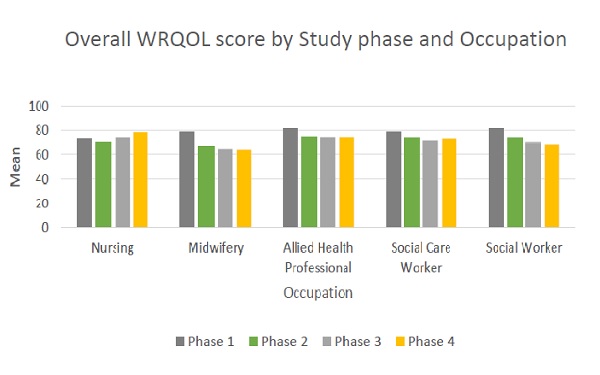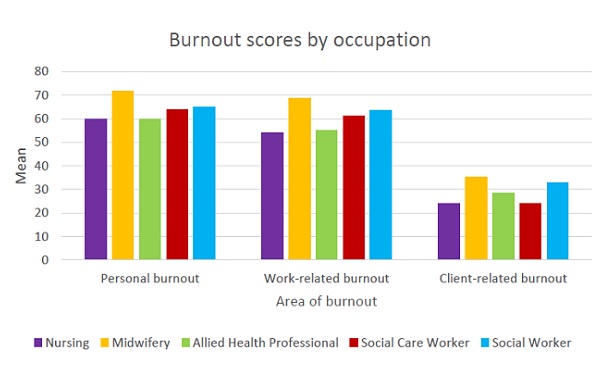
Social workers’ quality of working life continued to decline following the end of Covid lockdown measures despite other frontline professionals reporting improvements, according to a new study.
Phase four of the Health and Social Care Workforce Study, covering November 2021 to February 2022, found social workers were more likely to feel burnt out than social care workers, nurses and allied health professionals.
Social workers reported an increase in burnout related to working with service users, while most other professionals were less burnt out on this measure than in phase three, which covered May to July 2021, as the country was reopening from the last lockdown.
But social workers’ overall wellbeing recovered from phase three to four, as it did for other professionals.
Quality of working life continues decline
Respondents’ quality of working life, assessed using the Work-Related Quality of Life (WRQOL) scale, increased on average across all professions in phase four of the study, from 72.45 to 75.42.
This is the first increase recorded by the study but still lower than the 77.59 recorded in phase one, which covered May to July 2020.
But researchers found social workers’ quality of working life continued to decline, with scores of 68.92 on average in phase four, compared with 69.92 in phase three, 73.67 in phase two and 80.63 in phase one.
All other professions’ quality of working life recovered from phase three to phase four, apart from midwives, who reported a decline from 64.35 to 63.76.
The WRQOL scale asks professionals to say to what extent they agree with a series of work-related statements on career satisfaction, stress at work, general wellbeing, home-work interface, control at work and working conditions.
Scores of 71 or under indicate a lower quality of working life.

Credit: Ulster University
Practitioners burnt out by work with service users
Social workers’ ‘client-related’ burnout – defined as the extent to which they feel “prolonged physical and psychological exhaustion” perceived as being related to work with clients – increased from phase three (32.56) to phase four (32.9), while it dropped in all other professions except midwifery.
The study found that a lower proportion of social workers were suffering from high or severe client-related burnout but more experienced moderate burnout between the phases.
However, a score of 49 or lower is considered low, according to the Copenhagen Burnout Inventory, which was used to assess participants.
Practitioners’ burnout levels were higher for the two other domains – ‘personal’ and ‘work-related’ – but both fell from phase three to four, from 67 to 65.08 and from 64.06 to 63.45, respectively. These are considered moderate.
However, burnout levels across all three domains were higher for social workers than in phase two of the study (November 2020 to February 2021), as was the case across professions.
“Burnout scores had decreased UK wide, suggesting that overall health and social care workers are under less stress in their jobs, despite several people mentioning burnout among themselves or colleagues in the focus groups and open-ended survey questions,” the study authors said.
“Client-related burnout, however, has continued to rise amongst social worker respondents, suggesting that interactions with service users are more challenging and higher caseloads may be increasing burnout.”

Credit: Ulster University
Overall wellbeing recovers
Overall wellbeing among all professions increased on average from phase three to four, the study found, with social workers’ increasing from 19.31 to 19.95. This was measured using the Short Warwick Edinburgh Mental Wellbeing Scale, which asks people how they have felt over the previous two weeks. Scores range from 7 to 35, with 18-20 indicating a possible case of anxiety or depression.
But all occupational groups showed a decrease in their overall mean wellbeing scores from phase one (May to July 2020) of the study to phase four, except nurses, with social workers’ score falling from 21.14.
Social workers and midwives’ overall wellbeing also remained lower than they were for phase two (November 2020 to February 2021) of the study, unlike for other professions.
Related articles
Staff shortages over winter
Most respondents to the survey from all professions said their services were short-staffed due to Covid-related illnesses and shielding from the virus during a spike in infections in late 2021 and early 2022.
Social workers and other professionals also said recruitment and retention difficulties were exacerbating the pressures they were already facing from colleagues’ sickness absences.
One practitioner in England said they felt an increasing pressure as they had not been able to see and talk to colleagues face-to-face.
“Social work is innately problem solving, but not having a team base and continued uncertainty after so many months uncertainty takes its toll on us all. Morale is hard to keep up.”
Another in Northern Ireland said the pandemic continued to have a “significant” impact on social work education and the training of new staff due to much of the teaching being done online.
“There are limits to learning from direct work with service users. Many social workers are under so much pressure that they don’t have time for learning and development.”
Another survey respondent said that “there is a culture within social work of ‘just get on with it’”.
‘More recognition could help exhausted workers’
“The survey findings reveal that the health and social care workforce is continuing to struggle with the work changes from the Covid-19 pandemic,” the study authors said. These changes have increased work demands, increased staff burnout and stress, reduced staff morale and job satisfaction.”
“More recognition could help already exhausted workers with greater peer and management support. The changes to working conditions have been additionally frustrating inability with high vacancies and turnover and difficulties recruiting new staff.
“With increased workloads and changing working patterns, managers and human resource professionals have been dealing with the brunt of staff frustrations and backlash, this alongside a lack of recognition and understanding needs addressing as we progress through this next stage of the pandemic.”
SWU: ‘Social workers must feel valued’
John McGowan, general secretary of the Social Workers Union (SWU), said he was not surprised that practitioners were continuing suffer from burnout.
“Employers need to understand that to improve morale across their team, every member of staff needs to feel valued,” he said. “Some of the best protections from the impact of high turnover of staff are manageable caseloads and high quality, regular and reflective supervision, as well as improving administrative processes to enable for more direct and preventative. However, these protective measures are harder to achieve against a backdrop of funding cuts and an increasing number of children, families, adults and communities in need of help and support.
“Social work needs to be properly funded to retain the workforce and protect vulnerable children and adults. Funding for social work services has always been a major issue. One of the biggest crisis areas is local government budget cuts which have significantly increased financial pressures on the social care system.”


 A trauma-informed approach to social work: practice tips
A trauma-informed approach to social work: practice tips  Problem gambling: how to recognise the warning signs
Problem gambling: how to recognise the warning signs 




 Find out how to develop your emotional resilience with our free downloadable guide
Find out how to develop your emotional resilience with our free downloadable guide  Develop your social work career with Community Care’s Careers and Training Guide
Develop your social work career with Community Care’s Careers and Training Guide  ‘Dear Sajid Javid: please end the inappropriate detention of autistic people and those with learning disabilities’
‘Dear Sajid Javid: please end the inappropriate detention of autistic people and those with learning disabilities’ Ofsted calls for power to scrutinise children’s home groups
Ofsted calls for power to scrutinise children’s home groups Seven in eight commissioners paying below ‘minimum rate for home care’
Seven in eight commissioners paying below ‘minimum rate for home care’
 Facebook
Facebook X
X LinkedIn
LinkedIn Instagram
Instagram
John McGowan says that every member of staff must feel valued. How does he square that with his bosses at BASW getting over excited by the Social Worker of the Year Awards? Not all of us are valued if most of us aren’t “recognised” nowcare we?
How often is going to be the same old type of studies, looking at the same issues and saying the same things? How much money is being wasted on this **** leading to no systemic change?
The focus has shifted a lot in Social Work from investigating actual harm to future emotional harm mostly because social workers don’t have the specialized skillsets to understand the root cause of behavior. The layers of the onion skin need to be pulled back to investigate why a child behaves as they do.. it is rarely solely due to bad parenting. Any parent who passionately fights for their child is not likely to be purposely abusive. Refocus Social Work on actual harm and listen to parents who Approch for help. Do this alone will reduce the budget by millions and improve quality of work for Social Workers.